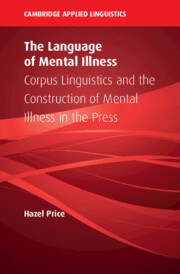 The Language of Mental Illness
The Language of Mental Illness Book contents
- The Language of Mental Illness
- The Cambridge Applied Linguistics Series
- The Language of Mental Illness
- Copyright page
- Dedication
- Contents
- Figures
- Tables
- Acknowledgements
- 1 Introduction
- 2 The Language of Mental Illness
- 3 Analytical Method 1
- 4 Analytical Method 2
- 5 Corpus Construction
- 6 The Shifting Meaning of Mental Health and Mental Illness
- 7 Named, Labelled and Referred to: People with Mental Illness in the MI 1984–2014 Corpus
- 8 ‘Suffering’ Illnesses and ‘Experiencing’ Symptoms
- 9 Do Newspaper Reports Accurately Represent the Symptoms of Mental Illness?
- 10 Conclusion
- References
- Index
8 - ‘Suffering’ Illnesses and ‘Experiencing’ Symptoms
Ways of Talking about Having Mental Illness
Published online by Cambridge University Press: 05 May 2022
- The Language of Mental Illness
- The Cambridge Applied Linguistics Series
- The Language of Mental Illness
- Copyright page
- Dedication
- Contents
- Figures
- Tables
- Acknowledgements
- 1 Introduction
- 2 The Language of Mental Illness
- 3 Analytical Method 1
- 4 Analytical Method 2
- 5 Corpus Construction
- 6 The Shifting Meaning of Mental Health and Mental Illness
- 7 Named, Labelled and Referred to: People with Mental Illness in the MI 1984–2014 Corpus
- 8 ‘Suffering’ Illnesses and ‘Experiencing’ Symptoms
- 9 Do Newspaper Reports Accurately Represent the Symptoms of Mental Illness?
- 10 Conclusion
- References
- Index
Summary
Chapter 8 explores the ways in which the press talk about people having mental illness using a mixed-methods approach. In the chapter, the frequency and semantic and pragmatic content of the verbs ‘suffer’ and ‘ experience’ in the context of prescribed forms for talking about having mental illness are investigated. I show that ‘suffer’ and ‘experience’ occur in different semantic contexts in the MI 1984–2014 Corpus as well as general language corpora, which may contribute to ‘suffer’ being a more problematic term for describing mental health than ‘experience’. Moreover, I show that ‘suffer’ is proportionally less likely to be used in first-person narratives because ‘suffering’ is attributed to people with mental illness by others, for example, medical professionals, in reported speech. I bring together my findings in a set of lexicogrammatical heuristics based on the semantic content of ‘suffer’ and ‘experience’ in context (e.g. whether the word encodes animacy or is temporally bounded).
Keywords
- Type
- Chapter
- Information
- The Language of Mental IllnessCorpus Linguistics and the Construction of Mental Illness in the Press, pp. 198 - 225Publisher: Cambridge University PressPrint publication year: 2022
